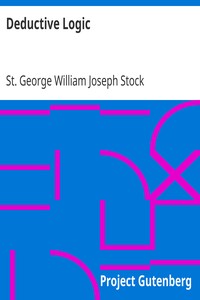Deductive Logic by St. George William Joseph Stock
"Deductive Logic" by St. George William Joseph Stock is a scholarly work on the principles of deductive reasoning, written in the late 19th century. This text aims to provide a comprehensive framework for understanding the formal laws of thought, focusing on the structure and function of logical statements, terms, and inferences within the context of established logic as taught in Oxford academic circles. The opening of "Deductive Logic" presents the author's intention
to synthesize existing knowledge in the field of logic, acknowledging the contributions of notable predecessors, including Mill and Aristotle. Stock elucidates the differences between inductive and deductive reasoning, emphasizing the latter as concerned with the relationships between propositions given certain premises. It subsequently defines key concepts such as thoughts, laws of thought, and the significance of formal logic, hinting at an organized exploration of terms, propositions, and inferences that will follow in the main body of the work. (This is an automatically generated summary.)
Read now or download (free!)
| Choose how to read this book | Url | Size | ||||
|---|---|---|---|---|---|---|
| Read online (web) | https://sendtokindle.compellingsciencefiction.com/ebooks/6560.html.images | 549 kB | ||||
| EPUB3 (E-readers incl. Send-to-Kindle) | https://sendtokindle.compellingsciencefiction.com/ebooks/6560.epub3.images | 236 kB |
Send
to kindle email: |
|||
| EPUB (older E-readers) | https://sendtokindle.compellingsciencefiction.com/ebooks/6560.epub.images | 242 kB | ||||
| EPUB (no images, older E-readers) | https://sendtokindle.compellingsciencefiction.com/ebooks/6560.epub.noimages | 223 kB | ||||
| Kindle | https://sendtokindle.compellingsciencefiction.com/ebooks/6560.kf8.images | 447 kB | ||||
| older Kindles | https://sendtokindle.compellingsciencefiction.com/ebooks/6560.kindle.images | 393 kB | ||||
| Plain Text UTF-8 | https://sendtokindle.compellingsciencefiction.com/ebooks/6560.txt.utf-8 | 457 kB | ||||
| Download HTML (zip) | https://www.gutenberg.org/cache/epub/6560/pg6560-h.zip | 232 kB | ||||
| There may be more files related to this item. | ||||||
Similar Books
About this eBook
| Author | Stock, St. George William Joseph, 1850- |
|---|---|
| Title | Deductive Logic |
| Note | Reading ease score: 63.3 (8th & 9th grade). Neither easy nor difficult to read. |
| Credits | Produced by Arno Peters, David Moynihan, Charles Franks and the Online Distributed Proofreading Team |
| Language | English |
| LoC Class | BC: Philosophy, Psychology, Religion: Logic |
| Subject | Logic |
| Category | Text |
| EBook-No. | 6560 |
| Release Date | Sep 1, 2004 |
| Most Recently Updated | Dec 29, 2020 |
| Copyright Status | Public domain in the USA. |
| Downloads | 144 downloads in the last 30 days. |
| Project Gutenberg eBooks are always free! | |

